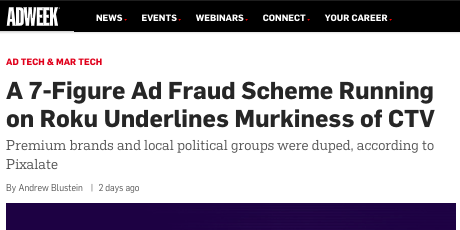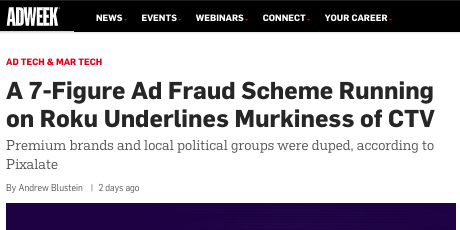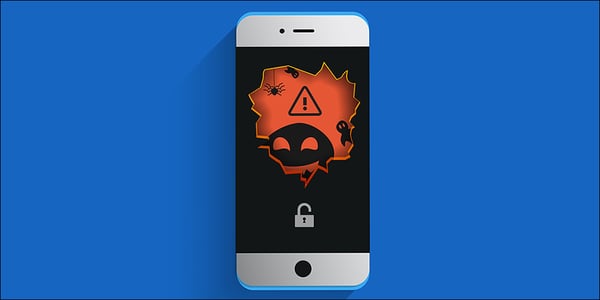
This week's review of ad fraud and quality in the digital advertising space.

Pixalate has unmasked "Monarch," an apparent Connected TV/OTT ad fraud scheme stealing from premium brands and political ad budgets. The discovery comes weeks after Pixalate's research into "DiCaprio," a different ad fraud scheme that also targeted Roku advertisers.
Learn more about "Monarch" in our blog.

Industry outlets have more coverage on "Monarch," the OTT/CTV ad fraud scheme recently unearthed by Pixalate researchers.
Adweek has the scoop, writing: "Roku has yet again found itself at the center of an ad fraud scheme that likely cost premium brands and political advertisers upwards of seven figures."
MediaPost writes that the "large-scale ad scam spotlights [the] vulnerability of OTT/CTV."
The Motley Fool makes note of the impacted brands, writing: "Chipotle Mexican Grill, Procter & Gamble, and Uber Technologies were all victims of an advertising fraud scheme that was perpetrated through apps associated with the Roku platform."

"A new malware family has been discovered operating in 56 Google Play applications, which have collectively been downloaded nearly one million times around the world," reported Dark Reading. "Dubbed 'Tekya,' the malware aims to commit mobile ad fraud by imitating user actions to click advertisements."
Nearly half (24) of the apps were designed for children, and the rest were utility apps, per Dark Reading.

"Ad-serving platform SpotX reports that traffic and ad calls are up across the board, particularly with [online video] and OTT/CTV," reported MediaPost. "CTV viewership 'is up every single hour of the day — with average viewership during March 12-18 up about 13% versus the previous week,'" per MediaPost, citing SpotX research.

Engadget has reported that Apple's Safari "now blocks all third-party cookies by default" across iOS, iPadOS and macOS. "It's the first mainstream browser to do so," reported Engadget.
*By entering your email address and clicking Subscribe, you are agreeing to our Terms of Use and Privacy Policy.
These Stories on Weekly Recaps
*By entering your email address and clicking Subscribe, you are agreeing to our Terms of Use and Privacy Policy.

Disclaimer: The content of this page reflects Pixalate’s opinions with respect to the factors that Pixalate believes can be useful to the digital media industry. Any proprietary data shared is grounded in Pixalate’s proprietary technology and analytics, which Pixalate is continuously evaluating and updating. Any references to outside sources should not be construed as endorsements. Pixalate’s opinions are just that - opinion, not facts or guarantees.
Per the MRC, “'Fraud' is not intended to represent fraud as defined in various laws, statutes and ordinances or as conventionally used in U.S. Court or other legal proceedings, but rather a custom definition strictly for advertising measurement purposes. Also per the MRC, “‘Invalid Traffic’ is defined generally as traffic that does not meet certain ad serving quality or completeness criteria, or otherwise does not represent legitimate ad traffic that should be included in measurement counts. Among the reasons why ad traffic may be deemed invalid is it is a result of non-human traffic (spiders, bots, etc.), or activity designed to produce fraudulent traffic.”

